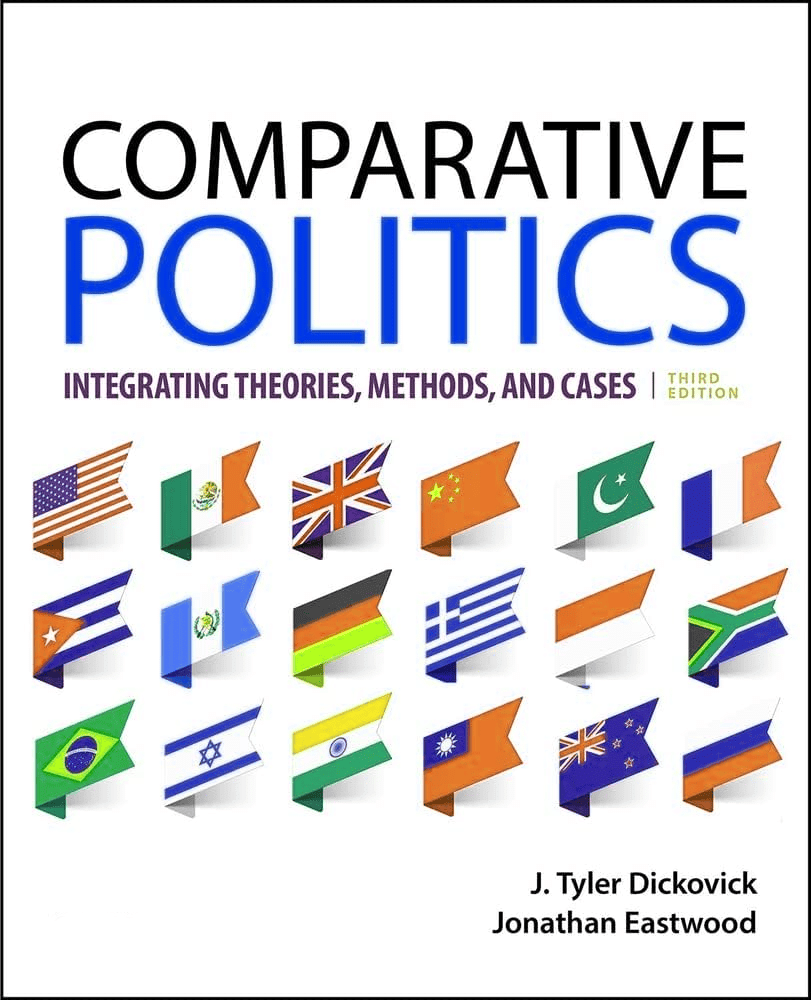Understanding of Comparative Politics | Political Science for CUET(PG) - CUET PG PDF Download
Comparative Politics

- Comparative politics involves examining the domestic politics, institutions, and conflicts of various countries.
- It often includes comparing different countries as well as analyzing changes over time within individual countries.
- This field systematically investigates and compares the diverse political systems worldwide.
- The aim is to understand why these systems resemble or differ from one another and how they have evolved.
- Aristotle, a Greek philosopher from around 384 BCE to 322 BCE, is frequently regarded as the pioneer of comparative politics and political science.
- He compared the political structures in Athens with those in other Greek city-states.
- Comparative politics may also be known as comparative government, focusing on the comparative analysis of different government forms.
- The field examines political systems globally, addressing themes like democratization, globalization, and integration.
- Examples include comparing presidential and parliamentary systems and democratic and authoritarian regimes.
- Multi-party systems like Canada’s versus two-party systems like those in the United States are analyzed.
- Comparative politics typically examines political frameworks at a specific point in time, usually the present.
- According to Arend Lijphart, comparative politics focuses more on methodology—exploring “how” to conduct analysis.
- This approach helps in understanding the nature and functioning of political systems around the world.
Here are some standard definitions of comparative politics:
- John Blondel defines comparative politics as "the study of patterns of national governments in the contemporary world."
- M.G. Smith describes it as "the study of different forms of political organizations, including their characteristics, correlations, variations, and changes."
- E.A. Freeman states that comparative politics involves "the comparative analysis of various forms of government and different political institutions."
Nature and Scope of Comparative Politics
The nature and scope of comparative politics have evolved over time, influenced by historical changes in its subject matter. This field has been shaped by both the geographical areas it covers—such as countries and regions—and the prevailing ideas about social reality and change, which have guided its approaches (including capitalist, socialist, mixed, and indigenous perspectives).
Historically, the nature and scope of comparative politics have been defined by shifts in its subject matter, terminology, and political perspectives. While these elements—subject matter, language, and perspective—are important, they alone do not fully distinguish comparative politics within the broader field of Political Science. Comparative politics shares many concerns with Political Science, such as democracy, constitutions, political parties, and social movements.
What sets comparative politics apart is its deliberate use of the comparative method to address questions of general interest within Political Science. This approach helps to analyze and understand political systems by systematically comparing different cases.
Why Compare and Methods of Comparison
Purpose of Comparison:
- The emphasis on the comparative method in political analysis is crucial for distinguishing the field of comparative politics from mere studies of foreign countries.
- The essence of comparative politics lies in its systematic and deliberate use of comparisons to study multiple countries.
- This approach aims to identify and explain differences and similarities in political phenomena.
- While earlier comparative politics often focused on merely classifying or polarizing political systems, contemporary analysis seeks to understand political phenomena within a broader framework of relationships.
Comparative Politics vs. Comparative Government:
- The misconception that comparative politics is solely about studying governments arises from conceptual confusion, according to Ronald Chilcote.
- Unlike comparative government, which is limited to comparing governments, comparative politics encompasses all forms of political activity.
- This field is expansive and is often viewed as the study of all political phenomena.
- Narrowing the scope to just governments or regimes would limit the criteria for what can be studied.
- Historically, comparative politics focused on government types and was predominantly concerned with Western countries.
- The decolonization process post-World War II sparked interest in new nations and a broader range of cases for comparison.
- This expansion led to the development of universal models to explain political processes.
- However, ideological differences and the rise of movements like non-alignment led to a decline in the relevance of these models.
- In the 1980s, there was a shift towards more localized comparisons.
- With globalization, there has been a renewed focus on large-scale comparisons, incorporating non-state actors and the impact of economic and technological connections.
Origins of Comparative Politics:
- The intellectual roots of comparative politics can be traced back to Aristotle.
- Aristotle studied and classified the constitutions of 150 states into different regime types.
- His work offered both descriptive and normative evaluations.
- He distinguished between ideal and corrupt regimes.
- This classification influenced later Roman thinkers such as Polybius and Cicero.
- Polybius and Cicero examined regimes from formal and legal perspectives.
- In the 15th century, Niccolò Machiavelli revived comparative studies.
- Machiavelli analyzed various principalities and republics to determine effective governance strategies.
The Late Nineteenth and Early Twentieth Centuries
- Liberalism was the dominant ideology during this period.
- European powers held significant sway over global politics.
- Asia, Africa, and Latin America were largely under European colonial rule or influence.
- Comparative studies of this era focused on analyzing institutions.
- These studies examined power distribution within European countries.
- Intergovernmental relationships were analyzed, particularly in Britain, France, and Germany.
- Studies were notably Eurocentric, concentrating exclusively on European political systems.
- Attention was directed towards European regimes.
The Second World War and After
The 1930s brought significant global changes. The Bolshevik Revolution of 1917 introduced socialism as a major ideological alternative to Western liberalism and capitalism. Post-World War II, several key developments occurred: the decline of European (particularly British) dominance, the rise of the United States as a new global hegemon, and the division of the world into two ideological blocs—Western capitalism and Eastern socialism.
Universalistic Models
- Universalistic models in comparative politics rose during this period.
- Key theories included David Easton’s political system theory.
- Karl Deutsch’s social mobilization theory was also significant.
- Edward Shils’ center-periphery model contributed to this development.
- Theories of modernization by Apter, Rokkan, Eisenstadt, and Ward were promoted.
- Political development theory by Almond, Coleman, Pye, and Verba gained traction.
- These theories were claimed to be universally applicable across cultures and ideologies.
- The expansion of comparative political analysis coincided with U.S. involvement in global affairs.
- This involvement included military alliances and foreign aid.
- The establishment of the journal Comparative Politics in 1969 marked a peak in this trend.
- Developmentalism emerged as a dominant conceptual framework during this time.
The 1970s and Challenges to Developmentalism
By the 1970s, developmentalism faced criticism for its abstract models that overlooked specific political, social, and cultural differences. Critics argued that these models were ethnocentric and inadequately addressed the conditions in the Third World. This period highlighted the need to focus on the unique challenges facing developing countries. Two major critiques emerged: dependency theory and corporatism. Dependency theorists argued against viewing exploitation merely in national terms, while corporatist critics challenged developmentalism's Euro-American bias, proposing alternative state and society organization models, often with a corporatist or authoritarian slant.
The 1980s: The Return of the State
In the late 1970s and early 1980s, in reaction to the backlash against developmentalism, new theories and topics emerged in comparative politics. These included bureaucratic-authoritarianism, indigenous concepts of change, transitions to democracy, the politics of structural adjustment, neoliberalism, and privatization.
The Late Twentieth Century: Globalization and Emerging Trends
During the late 20th century, from the 1960s to the 1980s, comparative political analysis expanded significantly. This period saw an increasing number of countries included in studies and the addition of more variables to models, such as policy, ideology, and governing experience.
Civil Society and Democratization Approach
- The collapse of the Soviet Union popularized the idea of the “end of history.” In his 1989 article “The End of History?” and the subsequent book The End of History and the Last Man (1992), Francis Fukuyama argued that the ideological evolution had concluded with the triumph of liberal democracy as the ultimate form of government.
Information Collection and Diffusion
- A major factor in globalization has been the rapid advancements in information and communication technology, particularly the Internet and the World Wide Web. These developments have greatly facilitated the production, collection, and analysis of data, as well as their rapid and widespread dissemination.
Notable Authors and Their Works
- James Bryce: Modern Democracies (1921)
- Carl J. Friedrich: Constitutional Government and Democracy (1937)
- Roberto Michels: Political Parties (1915)
- Maurice Duverger: Political Parties (1950)
- Herman Finer: Theory and Practice of Modern Governments (1932)
- Karl Deutsch: Social Mobilization
- Edward Shill: Centre and Periphery
- Almond and Coleman: Politics of Developing Areas
- Andre Gunder Frank: Capitalism and Underdevelopment in Latin America (1967)
- Walter Rodney: How Europe Underdeveloped Africa (1972)
- Malcolm Caldwell: The Wealth of Some Nations (1979)
- Guillermo O’Donnell: Economic Modernization and Bureaucratic Authoritarianism (1973)
- Ralph Miliband: The State in Capitalist Society (1969)
- Nicos Poulantza: State, Power, Socialism (1978)
- Peter Evans and Theda Skocpol: Bringing the State Back In (1985)
- Daniel Bell: The End of Ideology: On the Exhaustion of Political Ideas in the 1950s (1960)
FAQs on Understanding of Comparative Politics - Political Science for CUET(PG) - CUET PG
| 1. What is the nature of Comparative Politics and its significance in political studies? |  |
| 2. Why is it essential to engage in comparative analysis in political science? |  |
| 3. What were the key developments in Comparative Politics during the late nineteenth and early twentieth centuries? |  |
| 4. How did globalization impact Comparative Politics in the late twentieth century? |  |
| 5. What are some emerging trends in Comparative Politics today? |  |
















